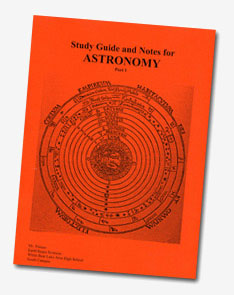Earth/Space Sciences
Astronomy: A Comprehensive Study of our Solar System & Universe
| Texts: | Discovering the Universe (5th ed.), Comins and Kaufman Study Guide and Notes for Astronomy, Pitman |
||
| Week | Schedule of Topics and Assignments | Reading | Quiz/Exam |
| 1 | The Universe as it appears and the Universe as it really is How we know the things we know A tour of our Universe: The solar system, stars, galaxies and beyond Lab: Math in Astronomy |
Foundations I | |
| 2 | Measurement in the Universe Distance: light-year and parsec Angular size and angular measure Lab: How to Locate Objects in the Sky |
ch. 1 | |
| 3-4 | The Night Sky Stars and constellations The celestial sphere: Our view from Earth Lab: Using a Star Finder |
Quiz 1 | |
| 5-6 | Earth, Sun, and Moon The apparent motion of the Sun The reason for the seasons Phases of the moon, eclipses and tides Lab: Solar Motion Demonstrator Lab: Phases of the Moon |
ch. 5 | Exam 1 |
| 7-8 | Planetary Motion Ancient astronomical discovery from Aristotle to Ptolemy Modern Astronomy: Copernicus, Tycho, Kepler, Galileo, Newton Lab: Geocentric/Heliocentric Cosmology |
ch. 2 | Quiz 2 |
| 9-10 | The Nature of Light and Optics The electromagnetic spectrum Telescopes An introduction to spectroscopy |
ch. 3, 4 | Quiz 3 Exam 2 |
| 11-12 | Stars and Stellar Evolution Stellar parallax and distance The nature and life cycle of stars Stellar class and the H-R diagram Lab: H-R Diagrams |
Foundations III ch. 10 |
Quiz 4 |
| 13 | Our Star: The Sun | Foundations II ch. 9 |
|
| 14-15 | The Solar System Planets and moons Interplanetary vagabonds (asteroids and comets) |
Foundations IV ch. 6-8 |
Exam 3 |
| Contemporary issues involving space exploration Exploration of the solar system and beyond The search for extraterrestrial life |
|||
| 16-17 | Introduction to Advanced Astronomy (the best is yet to come!) Galaxies and the Milky Way Quasars, pulsars, neutron stars, black holes |
Foundations IV ch. 14-16 |
Quiz 5 |
| 18 | Cosmology and the creation of the Universe The Big Bang and the expansion of the Universe Unifying theories: "Where do we fit in?" |
Exam 4 optional |
|
Astronomy: Guidelines & Expectations

We are partners in learning. During this course, you will have the opportunity to discover things about our Solar System and Universe that should amaze and fascinate you. I will make every effort to present this material in an interesting, informative, and provocative way. However, attending class and paying attention will probably not be all you need to do to achieve success here. I expect you to study at least 1 hour each day (7-10 hours/week), outside of class, so you may fully understand and assimilate this material. You need to make this effort.
Come to class on time. Students are expected to be in their assigned seat at the tone that marks the beginning of the period. Three or more unexcused tardies will result in disciplinary action. Each student is expected to exhibit appropriate classroom behavior. Disruptions and annoyances that interfere with students’ ability to learn will not be tolerated. The use of cell phones or other electronic devices will not be permitted during class.
Be prepared each day with your text (if requested), notebook, pen or pencil, calculator, and an active mind. Please don’t ask to borrow a pen, pencil, calculator, or mind.
If you miss a day, you miss a lot. It will be your responsibility to make up all work due to absence. Immediately upon your return to class, you should make an appointment with me to discuss what you have missed. Failure to do so may result in no credit (grade of 0) awarded for the assignments missed. Be sure to contact a responsible classmate to obtain notes you missed during your absence.
- You will have 1-day makeup time for each day you have an excused absence.
- If your absence is unexcused, no credit (grade of 0) will be given for that assignment.
- Missed assignments, labs, or tests must be made up after school on the assigned make-up date.
Assignments need to be completed on time. Work turned in late (except for absences noted above) will receive a grade reduction of 50% for the first day and will not be accepted beyond that time (grade of 0). Many of these assignments require several days to complete. Do not wait until the night before the due date to attempt to complete these tasks.
Your submitted assignments must be just that...yours. Cheating, including plagiarism, will not be tolerated. Penalties for this type of infraction will be severe, up to and including an F in the course.
Grading Procedure: Students receive their grade based upon the total number of points earned from the following assessments:
| Tests and quizzes: | 40% | Grading scale: | A | 93-100 | A- | 90-92 | |||
| Laboratory exercises and observations: | 40% | B+ | 88-89 | B | 82-87 | B- | 80-81 | ||
| Class activities (i.e. projects, reports, homework): | 20% | C+ | 78-79 | C | 72-77 | C- | 70-71 | ||
| D+ | 68-69 | D | 62-67 | D- | 60-61 | ||||
| F | < 60 |
This is an "elective" course. I am assuming you are here because you want to learn about Astronomy. To do well, your work needs to be completed on time and be a reflection of your best efforts.
Please also take a moment to read this letter from the National Commission on Excellence in Education.